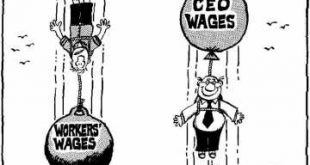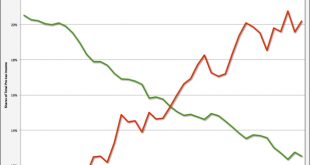from Peter Radford One of the least credible aspects of economics, an enterprise that suffers from a credibility problem at the best of times, is that of general equilibrium. Chasing after this mirage comes at a great cost. For one thing it makes economists look more like priests than scientists or even artists. It is an article of faith, not anything remotely plausible in a real economy. Any reference to general equilibrium in an article, book, or paper, automatically disqualifies its...
Read More »Lowering wages is not the solution
from Lars Syll In connection with being awarded The Sveriges Riksbank Prize in Economic Sciences in Memory of Alfred Nobel a couple of years ago, Thomas Sargent, in an interview with Swedish Television, declared that workers ought to be prepared for having low unemployment compensations in order to get the right incentives to search for jobs. This old mercantilist idea has very little support in research, since it has turned out to be exceedingly difficult to really get clear cut results...
Read More »Trumponomics and the inadequacies of the mainstream neoclassical economics orthodoxy.
from Julie Nelson I thought that any reasonable person would be revolted by the narcissistic, juvenile, bullying, lying behavior of the Republican candidate, and realize that he was clearly unfit for office. As an economist, I was taken aback by the variously kleptocratic and fantastical aspects of Trump’s intended economic directions. As a feminist and ecological economist, I was especially appalled by Trump’s braggadocious pussy-grabbing and climate-change-denying. While, according to...
Read More »IMF tells governments how to subvert public resistance against elimination of cash
from Norbert Häring The International Monetary Fund (IMF) in Washington has published a Working Paper on “de-cashing”. It gives advice to governments who want to abolish cash against the will of their citizenry. Move slowly, start with harmless seeming measures, is part of that advice. In “The Macroeconomics of De-Cashing”, IMF-Analyst Alexei Kireyev recommends in his conclusions: Although some countries most likely will de-cash in a few years, going completely cashless should be phased...
Read More »Tale of two countries
from David Ruccio This semester, we’re teaching A Tale of Two Depressions, a course designed as a comparison of the first and second Great Depressions in the United States. And one of the themes of the course is that, in considering the conditions and consequences of the two depressions, we’re talking about a tale of two countries. As it turns out, the tale of two countries may be even more true in the case of the most recent crises of capitalism. That’s because the two countries were...
Read More »The elite globalization consensus
from Robert Wade In this context globalization refers to the opening of domestic markets and the integration of global production via multinational corporations (MNCs). More broadly, it refers to movement in the world economy towards “one country”, or “deep (not shallow) integration”, where nation states have no more influence over flows of goods, services, capital, finance, ideas and people across borders than South Dakota or the other US states have across theirs. Ever since the 1980s...
Read More »Supply and Demand: fundamentally flawed model of labor market
from Asad Zaman I am currently engaged in teaching the final semester of Advanced Micro in our Ph.D. program. I have freedom to do here at PIDE, Pakistan, what may be extremely difficult in US/Europe — My course is built around demonstrating how conventional micro theory is strongly contradicted by empirical evidence. I also go on to build a convincing alternative. The first lecture on micro topics, starts by dismantling the fundamental Supply and Demand model in the context of the Labor...
Read More »Probability and economics
from Lars Syll Modern mainstream (neoclassical) economics relies to a large degree on the notion of probability. To at all be amenable to applied economic analysis, economic observations allegedly have to be conceived as random events that are analyzable within a probabilistic framework. But is it really necessary to model the economic system as a system where randomness can only be analyzed and understood when based on an a priori notion of probability? When attempting to convince us of...
Read More »Love it or leave it?
from David Ruccio Those of us of a certain age remember the right-wing political slogan, “America, love it or leave it.” I’ve seen it credited to journalist Walter Winchell, who used it in his defense of Joseph McCarthy’s anti-communist witch hunt. But it’s heyday was in the 1960s, against the participants in the antiwar movement in the United States and (in translation, ame-o ou deixe-o) in the early 1970s, by supporters of the Brazilian military dictatorship.* I couldn’t help but be...
Read More »Globalization and The Great Reversal
from Jacques Sapir Globalization is not, and never was, “happy” whatever various ideologues said. The idea that “sweet commerce”, was to be substituted for warlike conflicts, was much propagated. But, in truth, it was only a myth. Still, the warship preceded the merchant ship. The dominant powers have constantly used their strength to open up by force markets and modify the terms of trade as they see fit. The globalization that we have witnessed for nearly 40 years has been in combination...
Read More » Real-World Economics Review
Real-World Economics Review



